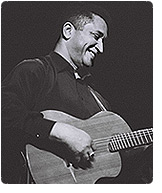|
|
 |
 An Exile Returns to Find Peace: The Renewal of Angola’s Waldemar Bastos
An Exile Returns to Find Peace: The Renewal of Angola’s Waldemar Bastos
“They say that when you drink the water of the Bengo River, you never forget Angola,” says Waldemar Bastos, who releases Renascence on Times Square Records on May 24, 2005, his first recording in seven years. Bastos—who has lived in exile since Angola’s civil war broke out—never did forget his homeland. But 2003 marked his first visit back home since the war ended, and this vision of peace and reconciliation shines throughout the new CD, which was produced by UK/Jamaican programmer Paul ‘Groucho’ Smykle (Gregory Isaacs/ Big Audio Dynamite/ Black Uhuru/ Baaba Maal).
On the song “Água do Bengo,” Bastos sings “He who drinks the water of Bengo will want to stay. He who drinks the water of Bengo will fall in love.” This yearning and love for country, permeates Renascence.
Most American audiences first heard Bastos on Pretaluz, a CD produced by Arto Lindsay. “We made the last album during a complicated, sad time for Angola,” Bastos explains. “It was a bad war. Many brothers killed brothers. I was very, very preoccupied. The new CD, Renascence, was made in a moment of renewal. This is a time with the dreams of the future in front of us. I believe music can create new possiblities, new perspectives. Renascence is my dream.”
One song, “Georgina,” imagines what it must have been like for many soldiers to return to Luanda after the war to find that their girlfriends had left them or even been killed. But the rest of the songs express national pride and hope. On “Dongo” (fishing boat), Bastos shows his appreciation for the beauty of the hard work and courage of the country’s fishermen, and for the joy their families feel each time they return from the dangers of the mysterious sea. While the small red fruit pitanga is usually an analogy for love, on “Pitanga Madurinha” Bastos sings of Angola’s ripeness for peace. As a bonus track, “Pitanga” was remixed with added vocals from Jamaican toaster Chaka Demus.
Born on the border of Angola and Congo in 1954, Bastos started singing at an early age. “Five centuries of colonization meant that when I was growing up I heard songs from many different cultures,” he explains. In addition to the African sounds he absorbed, he heard Brazilian music and cites the Beatles, Nat King Cole, the Bee Gees and Carlos Santana as early influences.
But with an independence war raging, Angola was not an easy place to live. When he was still at school, Bastos was detained and imprisoned by the Portuguese colonial secret police without reason. After Angola eventually achieved its independence in 1975, a bloody civil war engulfed the country. Bastos reluctantly concluded that this was not a climate in which musicians could develop and grow, and following a visit to Portugal in 1982, he decided not to return.
In April 2003, he went back to Angola for the first time in many years to perform in the national stadium in Luanda, the capital, in celebration of the ending of years of civil war. Since then he returned half a dozen times more, ensuring that the spirit of his African roots remained a powerful influence on the record. “I wanted to blend traditional and modern elements, because the future is only possible when you know the past,” he explains. As he was beginning to make the record, Bastos turned 50, a personal landmark which gave the record additional impetus. “Half a century makes you pause and look back at your life. But you also have unrealized hopes and dreams so it's about looking forward too. That process informed the record hugely,” he says.
Listen closely and along with “three singing African guitars,” as Bastos puts it, you will hear a variety of regional and global influences. “When I was a young boy, my parents both worked as nurses,” Bastos says. “We lived near all the poor people, and I listened to and played many different types of music: rumba, pop, tango, waltz, popcorn… Jimmy Hendrix! I still listen to all types of music. My father played the cello and I envisioned a string section on some songs, so we have a Turkish string section on this album. To create a new vision, you have to bring in others’ experience. My music is a bridge.”
“Going back was the key to this album because it was the first time I had ever seen peace in my country and hope and a belief in the future in people's faces,” says Bastos. “It was in that moment I heard the voice of my spirit telling me to make this record.”
|
|
 |
|
|
|